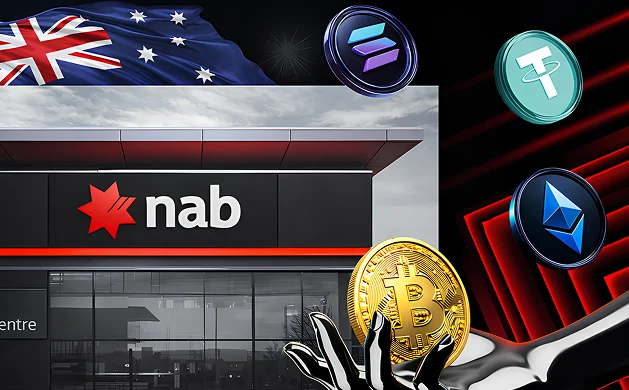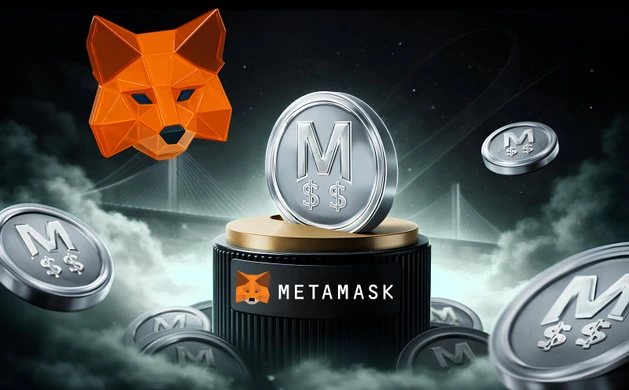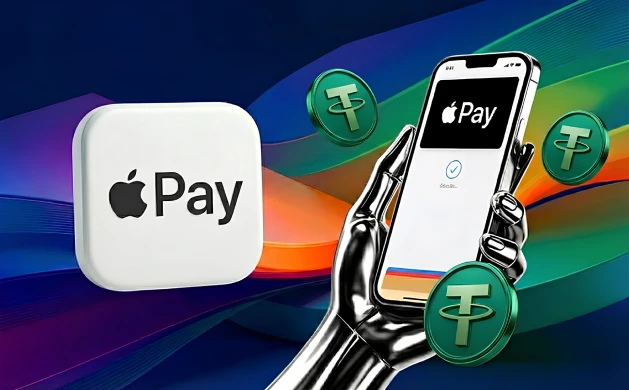Binance Supported and Restricted Countries (2026)
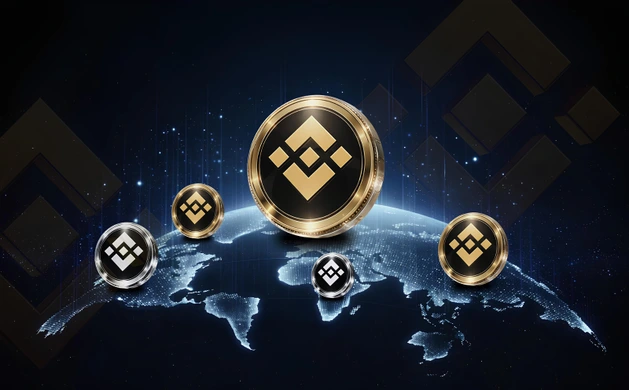
Summary: Binance enforces service restrictions in 8 jurisdictions, including the US and Canada, to ensure total compliance with international sanctions and global anti-money laundering frameworks.
The platform remains accessible in over 180 countries, supporting 50+ fiat currencies and holding 18+ regulatory licenses to provide a secure and legally compliant trading environment for 2026.
Binance, the largest cryptocurrency exchange in the world, provides services to over 500 different cryptocurrencies and serves 300+ million users from more than 180 countries.
Supported Regions
Europe, Australia, UAE, Hong Kong and 180 more
Licenses and Registrations
The AMF, OAM, Bank of Spain and other Tier-1 Licenses
Features
500+ Cryptos, Staking, Futures, Options and more
Which Countries Does Binance Restrict?
Binance outlines its geographical limitations within its official Terms of Use and dedicated List of Prohibited Countries. These policies allow the exchange to maintain global compliance by barring users from jurisdictions where legal or regulatory frameworks conflict with its services.
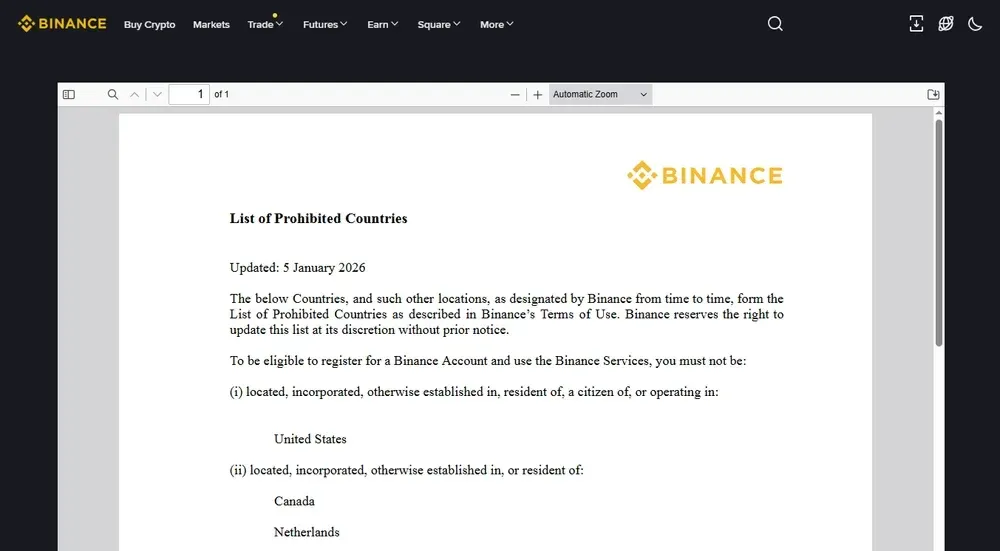
Binance Restricted Countries List in 2026
See the current list of Binance's restricted jurisdictions below:
Warning: Attempting to bypass these restrictions via VPN (Virtual Private Network) violates Binance's Terms of Use and may result in the immediate freezing of your account and funds.
Why Does Binance Restrict These Countries?
Binance implements geographic restrictions to align with complex global legal standards, ensuring the platform operates legally while protecting users from volatile or unregulated environments.
1. Regulatory Compliance and Licensing
Different nations enforce unique financial laws requiring crypto exchanges to obtain specific licenses or follow strict investor protection mandates before offering digital asset services.
Common regulatory reasons for restricting access include:
- FATF Standards: Binance closely follows the Financial Action Task Force (FATF) "Black List" and "Grey List," restricting regions with strategic deficiencies in anti-money laundering.
- EU MiCA Framework: The Markets in Crypto-Assets (MiCA) regulation requires 2026-compliant exchanges to hold specific CASP licenses to serve any of the 27 EU member states.
- US SEC & CFTC Mandates: Strict oversight from the Securities and Exchange Commission (SEC) and Commodity Futures Trading Commission (CFTC) effectively separates US users into a restricted, isolated platform.
- Local GRC Requirements: National regulators, such as the FCA in the UK or FINTRAC in Canada, often demand localized data storage and tax reporting that necessitate regional restrictions.
2. International Sanctions and Geopolitical Risks
Binance must adhere to international trade laws and economic sanctions to maintain its global operational status and avoid severe legal penalties from authorities.
Key geopolitical factors influencing the 2026 prohibited country list are:
- OFAC Sanctions: The US Office of Foreign Assets Control (OFAC) maintains comprehensive sanctions that prohibit Binance from facilitating trades in regions like Iran, Cuba, and North Korea.
- UN Security Council Resolutions: Binance enforces mandatory blocks on jurisdictions listed under United Nations Security Council sanctions to prevent the financing of prohibited regimes or activities.
- EU Restrictive Measures: The European External Action Service (EEAS) dictates specific financial freezes and asset blocks that Binance must implement to maintain its European operating licenses.
- High-Risk Jurisdictions: Areas identified by global intelligence as high-risk for terrorist financing or systemic fraud are proactively restricted to protect the integrity of the broader liquidity pool.
Binance Supported Countries
Binance remains the most accessible global cryptocurrency exchange in 2026, providing its extensive suite of trading tools to users across 180+ countries. The platform prioritizes high-growth markets where digital asset adoption is supported by clear regulatory frameworks.
According to Similarweb, Binance receives 77 million monthly visits, with the Republic of Korea leading in traffic at 9.7%. This is followed by Ukraine at 6.34% (despite restrictions), Brazil at 5.32%, Vietnam at 5.29%, and Turkey at 4.68%. The remaining global regions account for 68.67% of the total monthly visits.
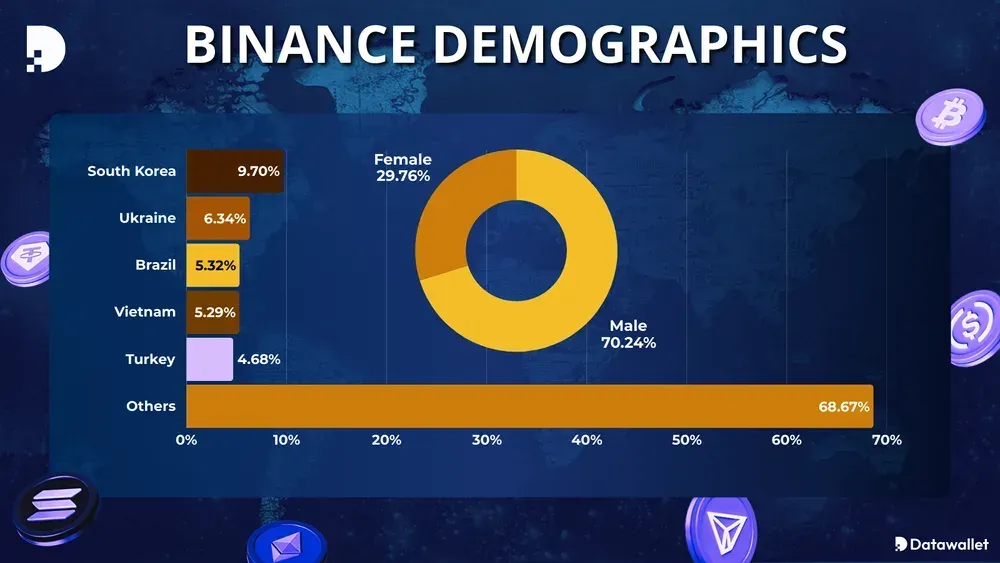
Key Supported Regions
- Europe: Serving verified residents in France, Italy, Poland, Bulgaria, and Romania.
- Middle East and Africa: Providing full services in UAE, Bahrain, South Africa, and Nigeria.
- Asia: Supporting high-volume markets including India, Thailand, Japan, and South Korea.
- Latin America: Maintaining active trading operations in Brazil, Mexico, Argentina, and Colombia.
Language & Currency Support
- Global Language Support: The platform provides a localized trading experience for a diverse international user base in 40 languages.
- Fiat Currency Options: Users can facilitate direct deposits and withdrawals for assets like EUR, BRL, and TRY across 50+ fiat currencies.
- Diverse Payment Methods: The P2P marketplace enables secure transactions via Pix, GPay, and local bank transfers using 800 different methods.
- Customer Support Speed: Dedicated teams deliver 24/7 technical assistance in native tongues with a standard response time of 15 minutes.
Can I Use Binance in the US?
United States residents cannot access the global Binance.com platform due to strict federal regulations. Instead, they must use Binance.US, a separate entity launched in 2019 to provide a fully regulated environment compliant with American financial laws and oversight.
The secondary platform operates under BAM Trading Services and maintains independent liquidity from the global exchange. While it offers over 190 assets, it lacks high-risk products like futures and derivatives to satisfy SEC and CFTC investor protection mandates.
Historically, Binance faced massive legal challenges, including a $4.3 billion settlement in 2023 for sanctions violations. However, by 2026, many civil lawsuits were dismissed, and the platform restored full USD banking services under a changing regulatory environment.
Although there are fewer features than on the international Binance platform, users in supported states can trade, stake, and manage their cryptocurrency portfolios. Consult Binance.US's official list of supported and restricted states for the most recent availability.
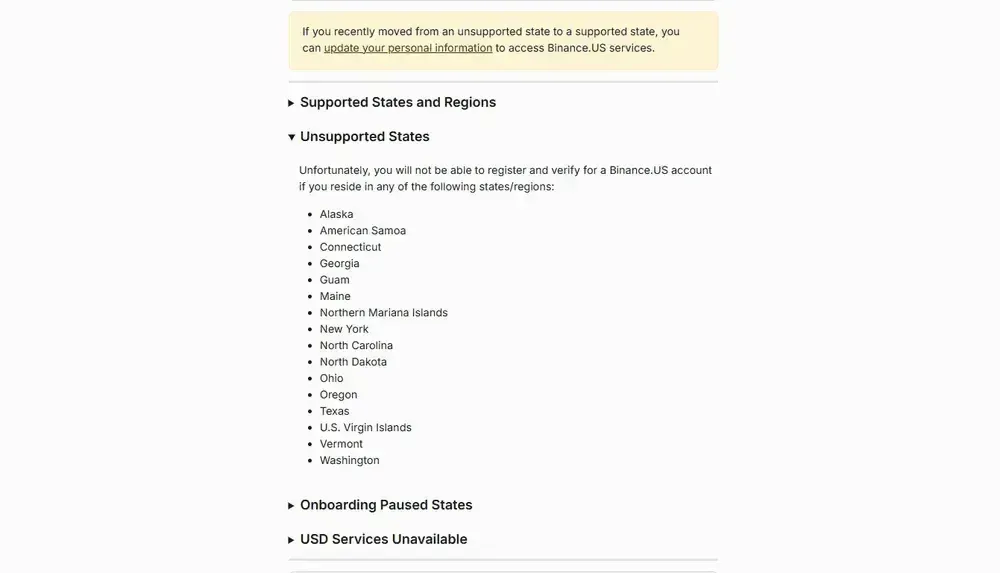
Binance Licenses and Regulation
Binance prioritizes global compliance by securing licenses from top tier financial regulators, ensuring that all 2026 trading activities meet strict international safety standards.
Below is the current list of 2026 active Binance licenses:
- France: Holding a Digital Asset Service Provider registration with the AMF to offer crypto services across the domestic French market.
- Abu Dhabi: Operating under a full ADGM license from the FSRA to provide global exchange, clearing, and brokerage services from 2026.
- Italy: Transitioning into the new CASP framework under Consob supervision to remain fully compliant with 2026 European union financial mandates.
- Spain: Maintaining a valid VASP registration with the Bank of Spain while implementing 2026 DAC8 tax reporting and MiCA requirements.
- Japan: Functioning as a fully regulated exchange under JFSA oversight to provide secure digital asset trading for the 2026 market.
- Thailand: Operating through the Gulf Binance joint venture after receiving a formal digital asset operator license from the local government.
- Bahrain: Utilizing a category 4 license from the Central Bank of Bahrain to offer comprehensive crypto asset exchange and custody.
- Kazakhstan: Authorized by the AFSA within the Astana International Financial Centre to operate a secure platform for trading digital assets.
- El Salvador: Registered as a Bitcoin Service Provider under the CNAD to facilitate legal crypto transactions within the nation of 2026.
- Poland: Providing regulated services to European users as a registered Virtual Asset Service Provider under the domestic 2026 financial framework.
- Lithuania: Holding an active VASP registration while upgrading internal systems to meet the mandatory 2026 MiCA licensing standards for crypto.
- New Zealand: Operating as a registered Financial Service Provider to deliver localized trading and exchange solutions to the domestic 2026 market.
Binance KYC Requirements
Binance mandates comprehensive identity verification to ensure platform security, prevent financial fraud, and maintain global regulatory compliance across all active 2026 trading accounts.
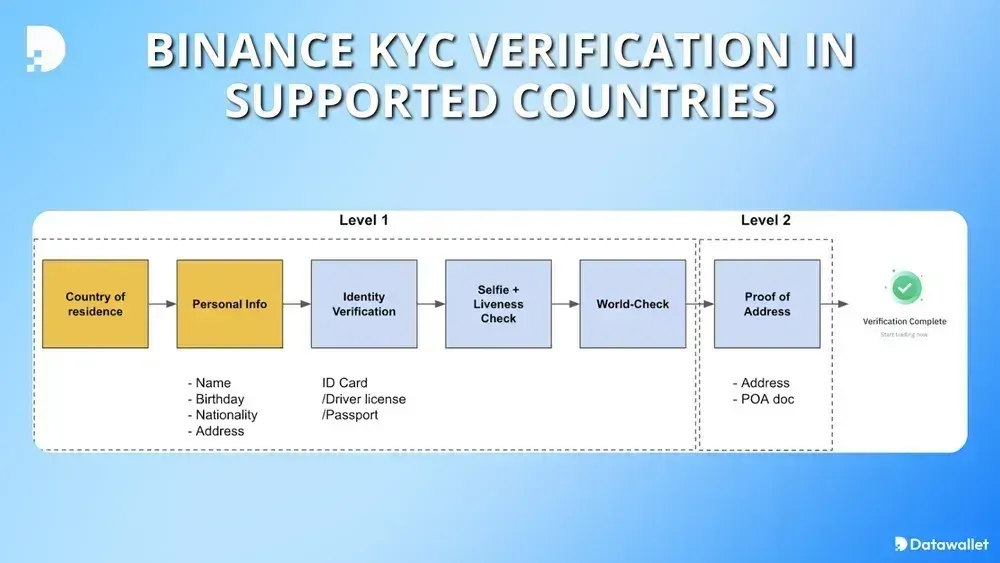
Verification Levels & Withdrawal Limits
Review the tiered verification requirements and daily account limits:
Verified (Level 1)
- Requirement: Valid government ID and facial recognition scan.
- Daily Withdrawal Limit: $50,000 fiat and 100 BTC in crypto.
- Features: Spot trading, P2P access, and simple earn products.
Verified Plus (Level 2)
- Requirement: Residential proof and advanced liveness verification check.
- Daily Withdrawal Limit: $2,000,000 fiat and unlimited crypto withdrawals.
- Features: Increased fiat limits and exclusive OTC desk access.
About Binance
Binance is the world’s leading blockchain ecosystem and cryptocurrency infrastructure provider, famous for operating the largest digital asset exchange by daily trading volume. Founded in 2017 by Changpeng Zhao and Yi He, the platform initially launched in China before expanding globally.
The company is currently led by CEO Richard Teng and co-CEO Yi He, who oversees the platform's long-term strategy and community growth. While originally decentralized, Binance has strategically established its global headquarters in the UAE to align with transparent 2026 regulatory frameworks.
As of 2026, Binance serves roughly 300 million users worldwide, offering a massive suite of products including spot trading, futures, and the BNB Chain. The ecosystem also features Binance Pay, a dedicated NFT marketplace, and advanced institutional services for professional traders.
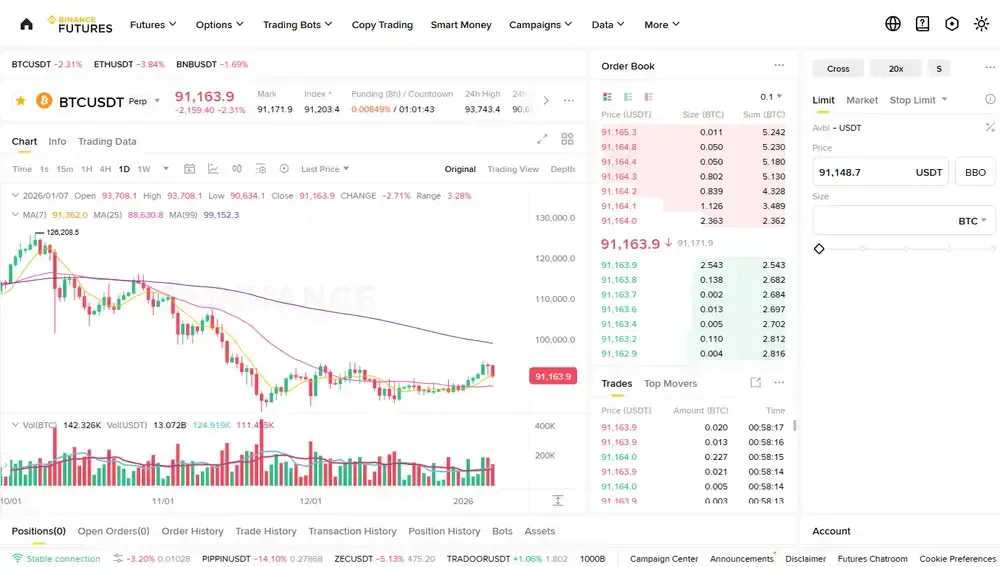
Final Thoughts
Binance currently maintains strict geographic blocks in major markets like the United States and Canada to ensure compliance with 2026 global regulatory standards.
The prohibited countries list remains dynamic, as the exchange actively negotiates new licenses that could soon restore full services to previously restricted jurisdictions.
Users should regularly monitor official policy updates and ensure their KYC status is current to adapt to the shifting atmosphere of international crypto laws.
Frequently asked questions
What is the Binance Travel Rule and how does it affect my international transfers?
The Travel Rule is a global 2026 regulatory standard requiring Binance to collect and share sender and recipient data for transactions exceeding specific thresholds. To comply, users may need to complete a brief questionnaire or perform a "Satoshi Test" (micro-transaction) when sending funds to self-hosted wallets or other external exchanges.
Can I recover my funds if I accidentally access my account from a restricted country?
Yes, but your account will likely be placed in "Withdrawal-Only" mode immediately. If you are traveling and your account is locked, you must contact 24/7 support to provide proof of your permanent residence in a supported region to regain full trading access and avoid a permanent ban.
Are there different restrictions for Binance Corporate and Institutional accounts?
Corporate entities face much stricter 2026 vetting processes, especially regarding their "Ultimate Beneficial Owners" (UBOs). If any significant stakeholder is a citizen or resident of a prohibited country like the US or Canada, the entire corporate account may be denied or restricted from specific high-liquidity products.
How do 2026 EU tax regulations like DAC8 affect Binance users in Europe?
Starting in 2026, Binance is mandated to report all user transaction data directly to national tax authorities across the European Union. This includes data on capital gains and transfers to external "cold" wallets, ensuring total transparency between the exchange and the European tax frameworks like MiCA.

Written by
Tony Kreng
Lead Editor
Tony Kreng, who holds an MBA in Business & Finance, brings over a decade of experience as a financial analyst. At Datawallet, he serves as the lead content editor and fact-checker, dedicated to maintaining the accuracy and trustworthiness of our insights.

